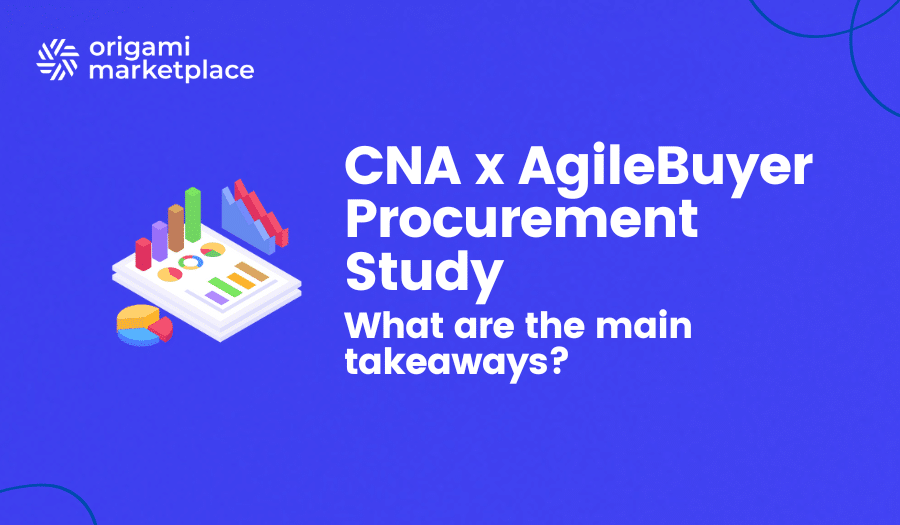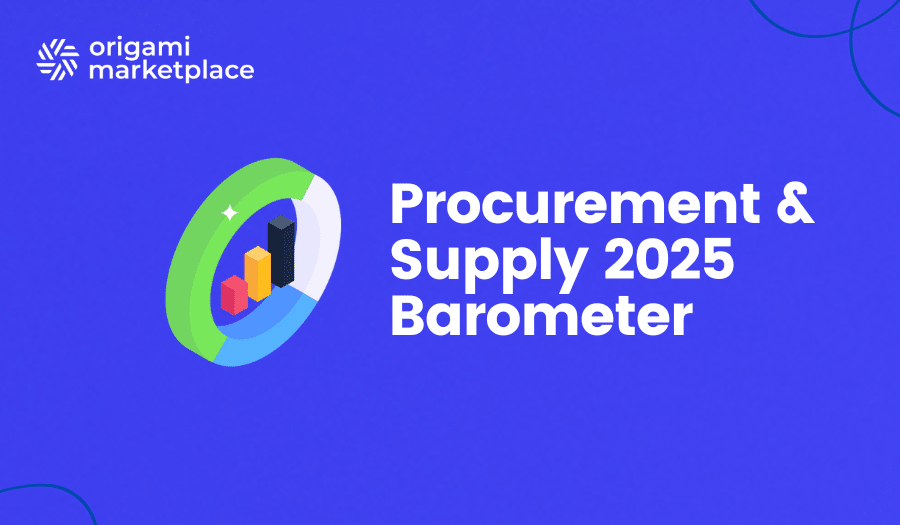Marketplace Product Feed Management: Guide + Comparison
- Arnaud
- 8 minutes reading
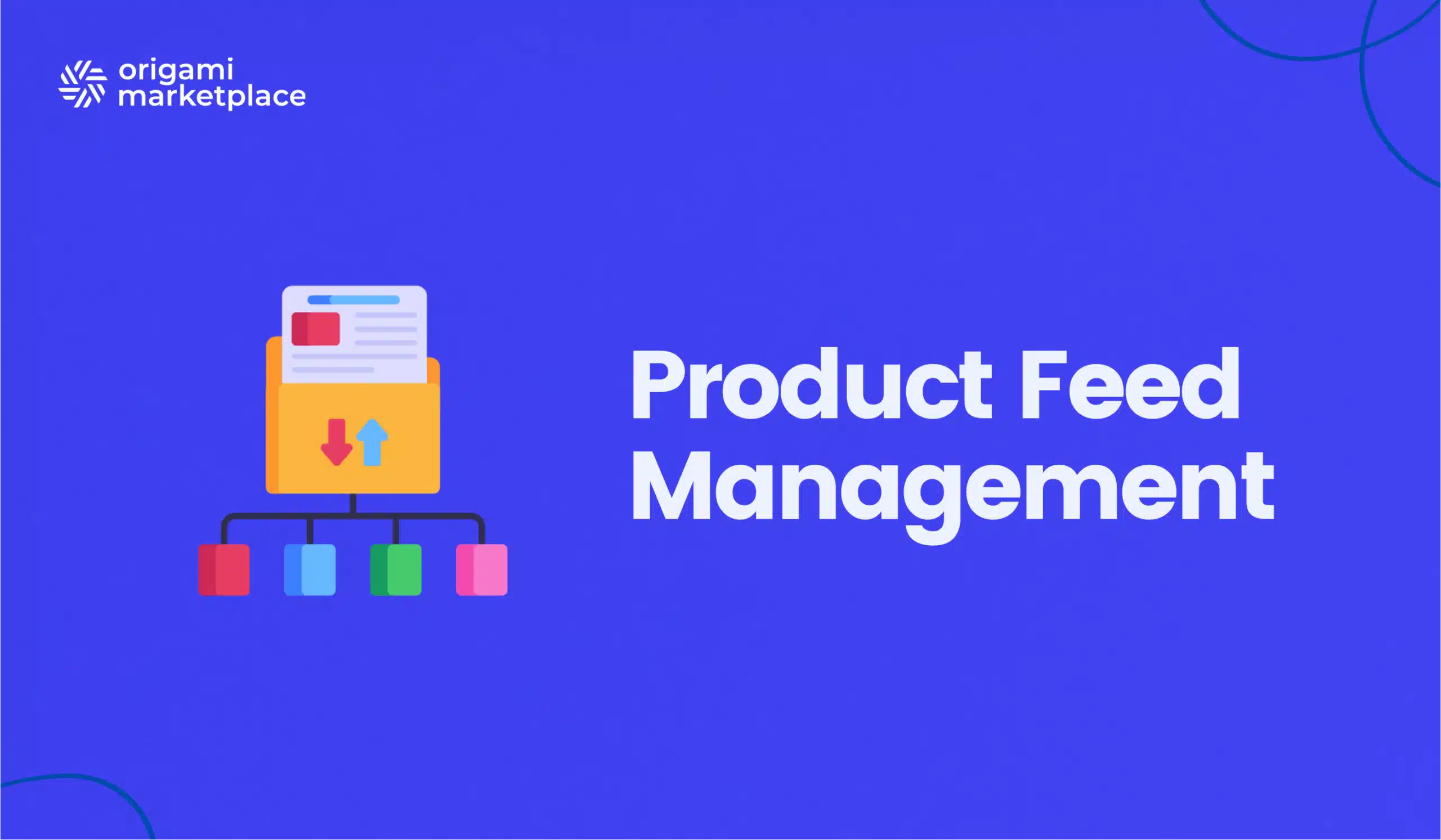
In the world of e-commerce and marketplaces, the visibility of your products is a crucial factor for boosting sales. Choosing a high-performance product feed management system drastically accelerates your visibility, allowing for rapid expansion of your presence across multiple platforms.
In this article, we will decode what a product data feed is, what a product feed manager offers, compare the best solutions on the market, and then focus on the advantages provided by Origami Marketplace’s product feed manager.
👋 No time to read the entire article? Find the summary of the article here.
1. What is a product data feed?
A product data feed is a file that centralizes all the essential information required to identify and sell your items online. It serves as a bridge between your internal catalog and external distribution channels (marketplaces, product search engines, etc.), enabling automated and consistent updates of your offerings.
This feed gathers two main types of data:
- Descriptive information: This includes all the product data necessary for their presentation. Examples include the EAN code, title, brand, description, main visual (image link), category, keywords, as well as specific attributes (size, color, material…) and characteristics. These data, essential for creating complete and attractive product listings, must be precise, structured, and compliant with the requirements of partner platforms.
- Offer information: This pertains to all variables related to the actual sale of the product. The minimum selling price and the quantity in stock are part of these key elements. Presented clearly, they help the buyer quickly obtain answers to their questions and make an informed purchasing decision.
With this file, e-commerce merchants no longer need to manually populate each channel. The product data feed ensures controlled and scalable distribution of references, offering an optimal shopping experience and enhanced visibility across different platforms.
2.What is a product feed manager?
A marketplace product feed manager, also known as a marketplace integrator, feed aggregator, or product feed manager, is an essential tool for e-commerce merchants looking to optimize the distribution of their product catalog across various online platforms. This tool allows for the easy and quick export, configuration, and synchronization of a product data feed tailored to the specific requirements of each marketplace.
Main features:
- Export and configuration of product data feeds: The marketplace product feed manager facilitates the creation of files (CSV) containing all the necessary information to list your products on different platforms.
- Adaptation to marketplace standards: Each marketplace has its own criteria and requirements for product presentation. The product feed manager ensures that your product listings adhere to these standards, thereby guaranteeing better acceptance and visibility of your items.
- Continuous synchronization: Some product feed managers offer real-time synchronization of orders and stock levels. This ensures that your information on all marketplaces is always up to date, preventing stockouts or price inconsistencies.
- Centralized management: The product feed manager allows e-commerce merchants to centralize all their orders through a single interface, simplifying their daily operations.
In simple terms, a marketplace product feed manager is an indispensable tool for any online business aiming to maximize its presence and performance across various sales platforms. It offers a centralized, efficient, and adaptable solution tailored to the specific needs of each marketplace while enabling optimized management of product data and better responsiveness to market changes.
3. The Advantages of product feed managers for marketplaces
Adopting a marketplace product feed manager offers a multitude of essential benefits for e-commerce merchants looking to optimize their presence and performance on various online sales platforms. Here are the main advantages:
- Quick and accurate stock updates: A product feed manager enables real-time stock updates, ensuring that the information available on marketplaces is always current. For example, tools like Iziflux or Origami Marketplace offer instant synchronization of available quantities, thereby reducing the risk of out-of-stock sales. This responsiveness also prevents potential penalties from marketplaces related to stock data inconsistencies.
- Advanced features for optimized management: Modern product feed managers integrate advanced features such as dynamic price optimization. They enrich product data feeds with competitive information, allowing e-commerce merchants to adjust their pricing based on market trends. Some tools also enable the retrieval of valuable data, such as Amazon sales rankings or the best available prices, facilitating informed decision-making.
- Centralization and simplification of marketplace management: A product feed manager centralizes all operations related to different marketplaces, eliminating the need for additional modules or third-party solutions. This simplifies daily management and reduces costs associated with installing and configuring multiple extensions.
- Automation of repetitive tasks: Through automation, product feed managers minimize manual tasks such as creating and updating product listings. They allow the definition of transformation rules that automatically adjust feed information based on the specific needs of each marketplace.
- Detailed dashboard and performance tracking: A good product feed manager offers a comprehensive dashboard to monitor the performance of your products on each marketplace. You can view key indicators such as revenue, number of orders, sales per product, and stock trends. This increased visibility facilitates performance analysis and optimization of commercial strategies.
- Centralized order management: Centralizing orders is another major advantage. It simplifies the shipping process, tracking, and updating of order statuses, thereby reducing errors and improving operational efficiency.
- Accessibility and compatibility with various CMS: Tools like Origami Marketplace are generally compatible with a wide range of content management systems (CMS) such as Shopify and PrestaShop. This compatibility allows for seamless integration with your existing infrastructure, facilitating the centralization of your e-commerce activities and the smooth management of your product catalog.
- Flexibility and scalability: A marketplace product feed manager is a flexible and scalable solution, capable of adapting to the growth of your business and changes in marketplace requirements. Whether you wish to expand your presence to new platforms or integrate additional features, these tools are designed to evolve with your needs.
A marketplace product feed manager is an indispensable asset for any online business seeking to maximize visibility, optimize catalog management, and improve performance across different sales platforms. With advanced features, efficient automation, and centralized operations, these tools allow e-commerce merchants to focus on their core business while ensuring a robust and high-performing multichannel presence.
4. "Exclusive" product feed manager vs. "All-in-One" product feed manager
There are two main categories of product feed managers, each presenting distinct characteristics in terms of features and responsiveness:
- “Exclusive” Product Feed Manager: These tools specialize exclusively in data transfer between the merchant and the marketplaces. They allow you to connect your catalog to different sales channels, thereby managing and distributing product data feeds. However, they do not necessarily offer advanced features specific to marketplaces. In terms of stock synchronization, “Exclusive” managers may update information every few hours, which can affect responsiveness to demand fluctuations. Additionally, price management often relies on third-party tool integration, which can limit adaptability and the speed of price adjustments.
- “All-in-One” Product Feed Manager: These managers are directly integrated into a solution like Origami Marketplace, offering a broader range of e-commerce-related features. In addition to managing and distributing feeds, they include modules for logistics, invoicing, promotions, and other essential operational aspects. Stock synchronization is optimized to occur within minutes, ensuring increased responsiveness to inventory changes. Moreover, “All-in-One” managers incorporate native price management features (minimum price, applying pricing rules, etc.), facilitating better adaptation to market conditions and contributing to increased sales. In this case, the product feed manager becomes an integrated module within the overall platform, offering an all-in-one solution for online commerce needs.
The main difference between these two types of managers lies in the scope of features and responsiveness times. “All-in-One” managers offer a more comprehensive and responsive solution, particularly advantageous for sectors where sales via marketplaces are crucial. In contrast, “Exclusive” managers may suit businesses seeking a specialized solution for feed management without requiring additional integrated features.
Download our free marketplace specifications template.
Here you will find all the essential features to succeed in your multi-vendor marketplace. This model provides a simple backlog to guide you through each step of your project.

5. Comparison of the best marketplace product feed managers
a. Origami Marketplace
Origami Marketplace is a comprehensive, scalable, and modular solution that natively integrates a high-performance product feed manager. This platform allows you to manage your entire online sales ecosystem, offering centralized and harmonized management of your various distribution channels.
Main features:
- Native integration: No need for third-party solutions; everything is directly integrated into the platform.
- Modularity: Easy customization of data according to your marketplace’s needs.
- Centralized management: Oversight of all aspects of online sales from a single interface.
- Advanced automation: Automation of feed updates, inventories, and prices within minutes.
Advantages for e-commerce merchants:
- Ease of implementation: Turnkey solution allowing for quick deployment without requiring technical skills.
- Flexibility and scalability: Easily adapts to market changes and the addition of new features without major complications.
- Dedicated support: Responsive technical assistance and customer support to help merchants with daily management.
b. Channable
Channable is a powerful feed management and ad automation platform designed to simplify the distribution of your products across a multitude of marketplaces and price comparison engines. With its user-friendly interface and advanced features, Channable enables e-commerce merchants to optimize and efficiently manage their product feeds while enhancing their online visibility.
Main features:
- Multiple connectors: Integration with over a hundred marketplaces, search engines, and advertising platforms, facilitating extensive distribution of your products.
- Visual feed editor: An intuitive tool that allows you to create and modify rules for data processing without requiring programming skills.
- Task automation: Automation of stock updates, prices, and product descriptions, thereby reducing manual interventions.
- SEO optimization: Advanced features to improve the ranking of your product listings on search engines and marketplaces.
- Tracking and reporting: Detailed dashboards providing comprehensive visibility into feed performance and generated sales.
Benefits for e-commerce merchants:
- Time savings: Simplified feed management through powerful automation tools, allowing you to focus on your business strategy.
- Flexibility and customization: Ability to customize feeds according to the specific requirements of each marketplace, ensuring optimal compatibility.
- Sales increase: Optimization of product listings for better visibility and attractiveness, contributing to increased conversions.
- Support and training: Access to responsive customer support and educational resources to maximize platform usage.
c. Iziflux
Iziflux stands out as one of the top current product feed managers. It allows e-commerce merchants to effectively distribute and reference their product catalogs on major general marketplaces such as Amazon, eBay, Cdiscount, and Fnac. With Iziflux, online sellers benefit from simplified and centralized management of their product data feeds while ensuring continuous updates and dynamic adaptation to market changes.
Advantages for e-commerce merchants:
- Time savings and efficiency: Automation of repetitive tasks related to feed management, allowing merchants to focus on higher-value activities.
- Error reduction: Minimization of human error risks through automatic synchronization and data validation before distribution.
- Multichannel expansion: Simplified access to numerous sales channels, thereby increasing reach and sales opportunities.
d. Lengow
Lengow is a longstanding player in the product feed management market, recognized for its reliability and extensive marketplace coverage. The platform offers a robust solution for e-commerce merchants aiming to optimize the distribution of their products across various sales channels.
Main features:
- Extensive marketplace coverage: Connection with a large number of national and international marketplaces, facilitating geographic expansion.
- Feed automation: Automatic updates of stock, prices, and product descriptions for seamless management.
- Feed customization: Ability to customize feeds according to the specific requirements of each marketplace.
- Optimization tools: Advanced features to improve the visibility and performance of products across different channels.
e. ShoppingFeed
ShoppingFeed is a comprehensive product feed management solution, specifically designed to help e-commerce merchants automate and optimize the distribution of their products across a wide range of marketplaces and sales channels. With its robust features and intuitive interface, ShoppingFeed facilitates multichannel management while enhancing commercial performance.
Main features:
- Extensive channel integration: Connects with numerous marketplaces and sales channels, enabling rapid and efficient expansion.
- Centralized product management: Single interface to manage and synchronize inventories, prices, and product descriptions across all channels.
- Advanced automation: Tools to automate feed updates, order management, and performance tracking.
- Ad optimization: Features to enrich and optimize product listings, thereby improving their visibility and attractiveness.
- Analytics and reporting: Comprehensive dashboard with detailed reports on sales performance, market trends, and key indicators.
Benefits for e-commerce merchants:
- Operational efficiency: Reduction of manual tasks through automation, allowing for more effective and scalable multichannel sales management.
- Increased reach: Access to a vast network of marketplaces and sales channels, thereby increasing sales opportunities and product visibility.
- Customization and control: Ability to customize feeds according to the specific needs of each channel, ensuring optimal compatibility and performance.
- Customer support and resources: Dedicated technical support and access to a library of resources to help e-commerce merchants make the most of the platform.
To maximize your sales on marketplaces, it is essential to choose a product feed manager tailored to your specific needs. Do not settle for a generic solution: prioritize a tool that offers native integration, advanced automation, and compatibility with your existing systems. Investing in the right product feed manager, such as Origami Marketplace, can transform your online presence and allow you to focus on what matters most: growing your business. Feel free to test different solutions and request personalized demonstrations to find the one that perfectly aligns with your goals.

Antoine Mantel
→ Talk to our solutions expert
6. Why adopt Origami Marketplace’s product feed manager?
- Automation and simple data updating: Origami Marketplace facilitates the automation of updates. You can apply pricing rules, promotions, product attribute modifications, or adjust stock levels in real-time. With an intuitive interface, updating is simple, quick, and error-free.
- Maintain product data quality: By using Origami Marketplace’s product feed manager, you maintain a high level of data quality. Each product is enriched and formatted according to the requirements of targeted marketplaces, ensuring better visibility and an optimized conversion rate.
- Empower sellers with autonomy: Thanks to a smooth user experience (UX), Origami Marketplace’s product feed manager allows sellers to easily manage their feeds. They can modify product listings, adjust prices, apply discounts, or manage stocks independently, without constant operator intervention.
- Compatibility with external CMS (Shopify, PrestaShop): Origami Marketplace’s product feed manager can connect to external content management systems (CMS) such as Shopify or PrestaShop. This compatibility facilitates the centralization of your e-commerce activities and simplifies the management of your catalog and orders, regardless of your tools and technical environment
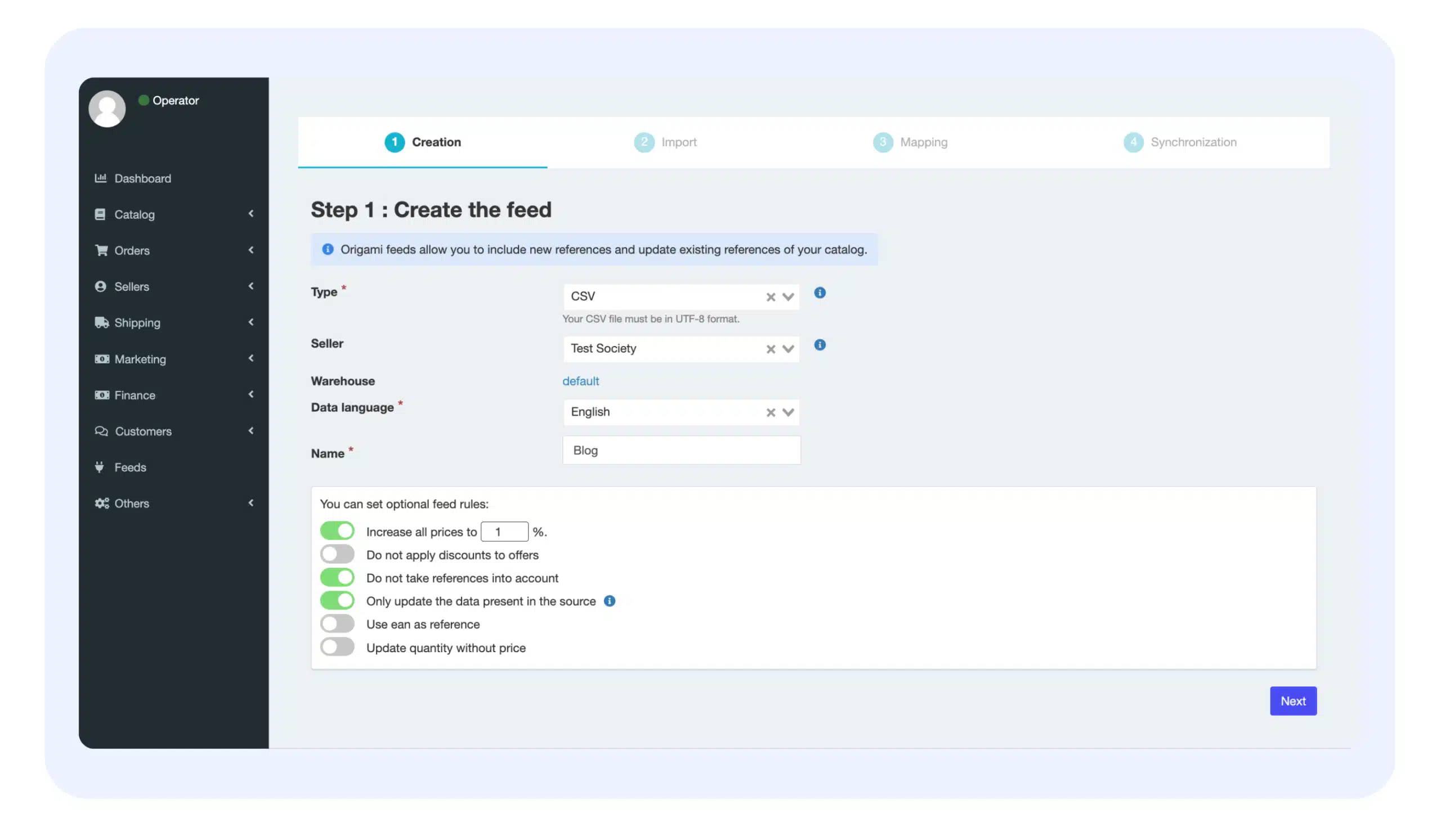
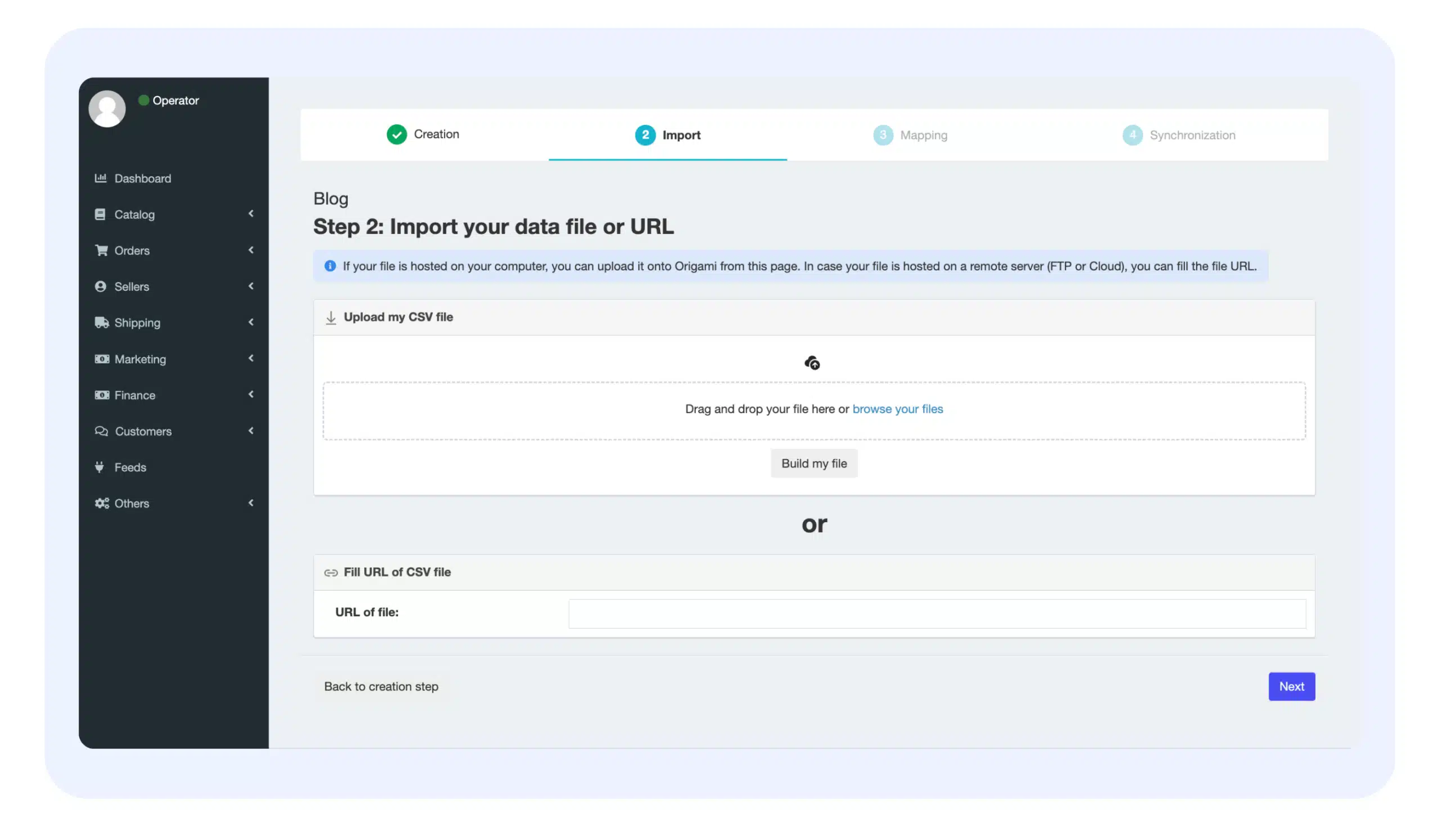
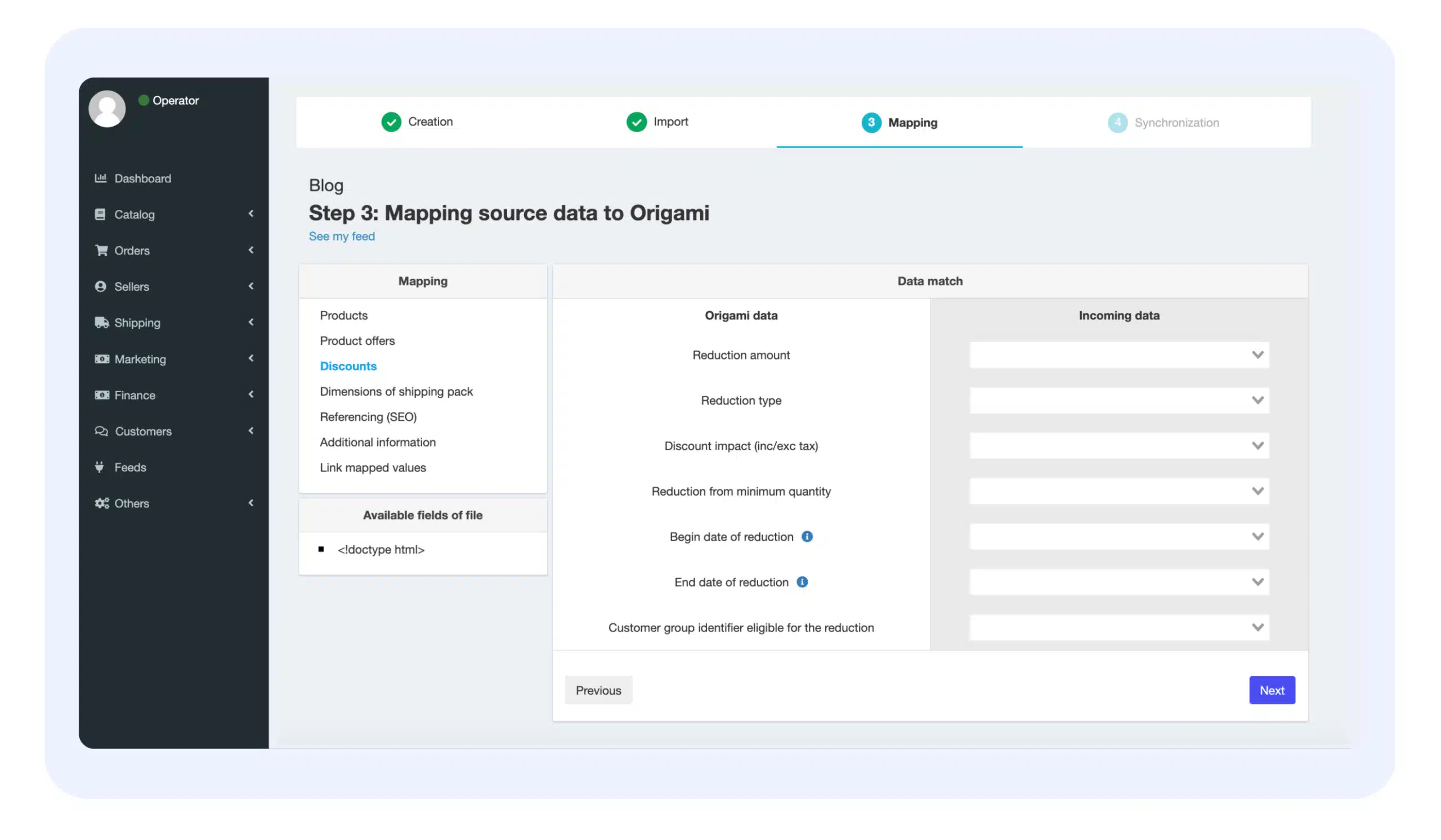
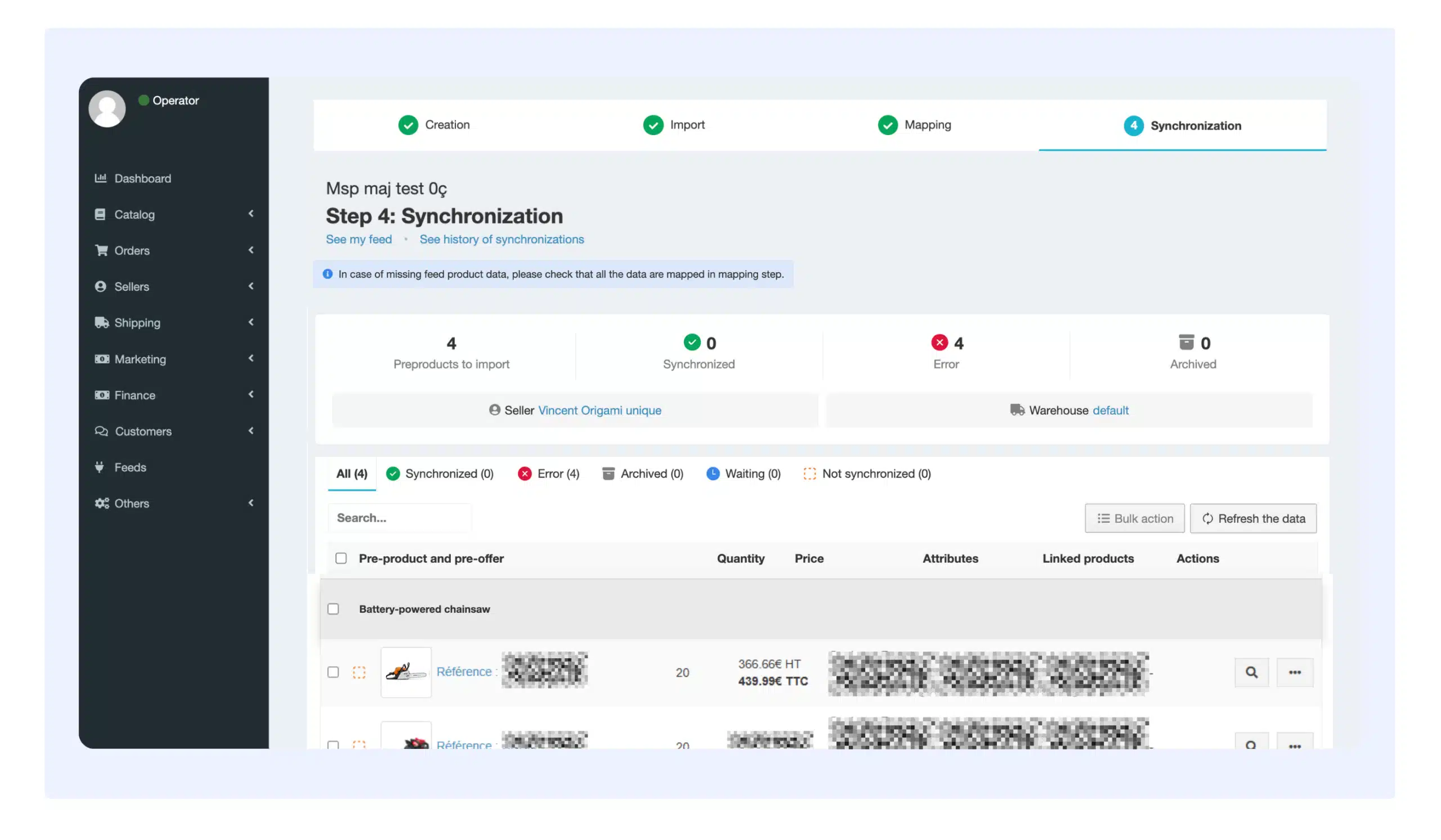
Choosing an appropriate marketplace product feed manager is essential for increasing visibility and optimizing the management of your product catalog across different platforms.
While third-party solutions like Channable, Iziflux, Shoppingfeed or Lengow remain viable options, Origami Marketplace’s integrated product feed manager offers a turnkey solution that is more economical and easier to manage.
By opting for native integration, you maintain the quality of your data, save time, avoid additional costs, and provide a seamless experience for your sellers. A winning strategy to boost your sales and strengthen your position in the e-commerce market. If you wish to discuss the topic, our experts are here to assist you.
Key takeaways:
Definition of a product data feed: A product data feed centralizes all the necessary information to sell your items on various platforms, facilitating consistent and automated distribution.
Role of the product feed manager: This tool optimizes the export, configuration, and synchronization of product data feeds, ensuring adaptation to the specific requirements of each marketplace.
Key Advantages:
- Real-time updates of stock and prices
- Centralization of management across different marketplaces
- Automation of repetitive tasks
- Detailed performance tracking via dashboards
- Inventory optimization and error reduction
Types of product feed managers:
- “Exclusive” product feed manager: Specialized in data transfer without additional features.
- “All-in-One” product feed manager: Integrated with additional modules for comprehensive online commerce management.
Why choose Origami Marketplace?
- Automation and simplified data updating
- Maintenance of product information quality
- Seller autonomy through an intuitive UX
- Compatibility with various CMS such as Shopify and PrestaShop
Winning strategy: Adopting a high-performance product feed manager is crucial for increasing your visibility, optimizing catalog management, and improving your performance on marketplaces. Origami Marketplace stands out with its native integration, value for money, and ease of use, making it an ideal solution to boost your online sales
Discover how Origami Marketplace’s API and partner network can transform your business, regardless of its size, with its innovative marketplace-based solution.

